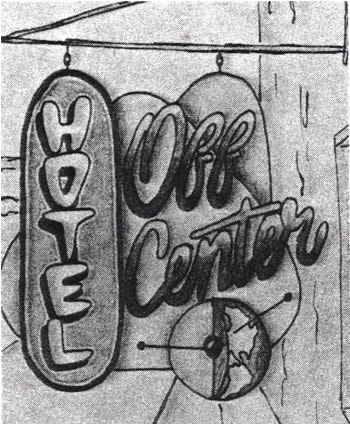 |
||||||
|
|
So, Nachtman says to himself, why not the desert? Yesterday his son called from Los Angeles, said why didn’t he get out more, he didn’t have to stay in that room reading and reading, it wasn’t healthy. Today, heeding his son’s advice, Nachtman points his five year old Ford south along I-15 and thinks maybe he’ll go to Moab. Moab in September. Why not? On the Brigham Young University radio Leslie Norris is reading a long poem about being a child in Wales—streams, flowers, birds, innocence. Artifacts gathered from the Romantic warehouse and shaped into lyric. Leslie Norris died last year, but KBYU has stored snatches of poetry, stories, anecdotes, interviews. The radio has given him a secondary existence, an electromagnetic afterlife. Nachtman met the man once, after a reading; here was your regular lion in winter, Nachtman thought then. Leslie Norris had dignity, white hair, a spread-legged solid stance. —I thought you would have been younger, the poet said. He looked at Nachtman sadly. Nachtman was puzzled. Younger than what? Maybe Leslie Norris thought he was someone else, another Nachtman, a doppelganger. Sometimes he suspects there might in fact be a shadow Nachtman walking around Salt Lake City. Now and then people accuse him of things he’s never done, swear they saw him in places where he’s never been. They are reliable people, men and women you could trust. Now it’s hawks floating above a canyon floating from the radio, a different poem, another vision. Norris alive was a nature guy, a walker, an explorer in little, a lover of the plants and animals that people the world, an admirer of the rocks and sand, the streams, the canyons, the whole Romantic panoply of the sublime. Also like the Romantics a passionate lover of memory. This last love Nachtman shares with the dead poet. He carries his cherished former selves over his shoulder the way a chambered Nautilus carts his undiscarded shells. Natchman remembers the comparison from an essay he read last year. The essay’s author was obsessed with analogies, comparisons, metonymies and metaphors for the human condition. The spread of his language, glorious as the tail of the peacock, was, in Nachtman’s opinion, not a consolation for the human condition, which is at best bleak. Or not—this bleaknesss could be a matter of mood, or of the condition of the body. Pain in the bones makes the world look bleak, if it doesn’t make the world disappear altogether. Natchman, impatient, drives faster than he should but steers with care, pays attention. He fears the big articulated trucks whose tires are as tall as his car. What if the inflated spinning construction of rubber and steel disintegrates while he’s alongside? Like TNT, like dynamite, Semtex, C-4. He stamps the accelerator to get by more quickly, anxious to shoot himself forward, ahead of the unlikely but possible catastrophe. Down the valley, past Point of the Mountain, with the hang-gliders and para-sailers on one side and the penitentiary on the other. To the left the gaudy cloth wings—red, yellow, periwinkle blue—move across the sky in big loops; tiny figures dangle underneath, men in search of a different sublime. On the right side of the freeway are the low earth-colored oblong buildings, the high chain-link and razor-wire fences, the guard towers. Years ago Nachtman taught literature to some of the better-behaved prisoners. Class was held in the prison chapel and Nachtman spoke from the pulpit; his voice echoed from the vaulted ceiling, was rendered larger than life. He said Faulkner, he said Hemingway, he said Virginia Woolf. In front of him the prisoners sat in rows; their faces reflected nothing. In this they resembled the men Nachtman used to play poker with on Tuesday evenings. Leslie Norris thought the eyes were the windows of the soul; behind the eyes Nachtman stared at from the prison pulpit the shades were pulled down, the blinds closed. The men to whom he said Donne, Spenser, Shakespeare, Milton, were islands unto themselves, isolatoes, singularities. Eventually Nachtman stopped talking. He and the prisoners stared at each other. After a few weeks of this silence the prison authorities, reasonable men, asked him to resign. Nachtman saw the justice in their decision and agreed, though to him the silence was interesting, maybe even useful. It hollowed out a space for thought; if these men with the big arms, the wide necks, the tattoos, had continued to listen while he didn’t speak, they might have learned something. But all this was pure speculation and Nachtman wasn’t ready to explain his unreasonable ideas to the reasonable men in their blue shirts. Phallic striped ties hung from their necks like fetishes; they said no more and Nachtman agreed. Leslie Norris comes to an end and the station announces a speech by one of the Church Authorities. An apostle? A member of the Quorum of Seventy? The Twelve? Nachtman never learned the complex hierarchy of the church, but religion makes him anxious and he fumbles with the radio until he finds an oldies station. The Mamas and the Papas. Buffalo Springfield. The Jefferson Airplane. A truck comes up on the left and Nachtman scoots ahead to get away from the big dangerous wheels, the explosive tires. Nachtman has good memories of the sixties. A little too old already for the summers of love, he had nevertheless enjoyed the psycho-sexual turmoil, the rebirth of Rousseau, the noble savages moiling in the American streets, bare-breasted girls and long-haired boys. If California dreaming had never become a reality, still it had been a fine dream; it had written The End to Eisenhower’s America. Now of course, forty years later, Eisenhower’s America doesn’t look so bad; with the torturers and the seekers for empire at the wheel of government anything could come to pass. Has come to pass already. How could we have elected a man who looks like Chevy Chase, Nachtman would like to know. An oil barbarian. A fraternity boy, a bully. Nachtman has thought about emigrating to Canada, he’s considered Sweden or Denmark, but all the socialist countries have a lousy climate, cold and depressing. Also they’re too far north and Nachtman even in Utah dislikes the short days of winter, the cold that makes his bones ache, the snow, the ice, the long black nights when he dreams disturbing dreams. Nachtman, who has never before he came to Utah lived in the desert, wills himself at home here, a sand and rock man. There’s France of course, where he was born, but young Nachtman left too quickly to learn the language well, too soon to get fitted for the customs and civilized ways the French wear like a good suit; if he went back he’d be a foreigner, ignorant, unlettered and savage. He drives past the ruins of the uranium mill, crosses the Colorado and rolls into Moab in the late afternoon—it’s early fall, there’s still light, a low sun with long shadows down the main street. A dreamy dreams kind of place. The last time Moab was real it was a radioactive kingdom, ruled by Charlie Steen from the top of his hill. Now it’s a destination, an American grotesque, full of the young and the eager. The mountain bikers look at Nachtman without curiosity. The German and Japanese tourists, reverse-engineered into world-citizens after the nightmare of World War II, walk in groups speaking their incomprehensible tongues. At the Hotel Off Center Nachtman says good afternoon, says do you
have a room available, signs the register. —What does the M stand for? The keeper of the inn is a woman in middle age with a kind face, plump lips, short gray hair, clearly a good person, though given the peculiar place where she works there is a strong potential for goofiness, confusion about the world. Still, if there were such a thing as normal, she would look normal. And kindness must be encouraged. —Michelangelo, Nachtman tells her. My mother wanted me to be a painter. She also wanted me to be a Christian. —I’m Celeste, the inn-keeper says. I refused both, Nachtman thinks, and she died. He carries his suitcase up the stairs to the Cowboy Room. The walls are densely covered with whips, branding irons, spurs, the cruel instruments of the West. He could have had the Jules Verne room, but the painted mermaids, the tentacled Kraken, the moustached sailors, depressed him. From the suitcase Nachtman unpacks clothes, toilet articles, medications, half a dozen books. The Origin of Species; Destroy, She Said; The Rise and Fall of the Third Reich; The Stranger; Blue of Noon; The Songs of Maldoror. Nachtman arranges the books on the bedside table. If he can’t sleep in the Cowboy Room he can read. He can’t run but he can hide. Maman died today. ... Maybe it was yesterday. In Nachtman’s case Maman died twenty years ago, but it’s the same thing, or at least not so different. He’s no Meursault, no leaper into death, but like the stranger he is a detached man, a square peg, a superfluous person. Fungible and intransitive. Surrounded by the emblems of the 19th century hung on the walls, the dream of the Frontier made into twisted iron and sharpened steel, he should be reassured by American tradition; instead he feels precarious, uneasily balanced, vulnerable to even a minor cultural shift in this new America, this nation ruled by the mad and the imperious. He thinks he’s witnessing the end of the Republic. It didn’t last long, sub specie aeternitatis. Barely long enough for a twinge of regret, which, however, is for Nachtman a powerful emotion. He’s a regret specialist. He’s made a lifelong study. If there was a Department of Regret in the university Nachtman could chair it, teach graduate courses, direct dissertations. He could author critical articles, textbooks, and learned monographs. A Topology of Regret. The Logic of Regret in Late Stage Capitalism. Regret: an Introduction. —————— X-rays reveal nothing to Nachtman. He’s willing to believe that he’s staring at a mediated representation of himself as a body-in-depth, a body inhabited by bones, a circulatory system, organs whose forms are only barely perceptible against a veiled luminous background, but belief remains only belief, unconfirmed by perception. —And that, he says. What’s that there, that shadow shaped like a peach? Is that my heart? Is it a cancer? Am I dying? It’s too soon, he wants to say. —There’s nothing wrong with you, the doctor tells him. He doesn’t turn to see where Nachtman is pointing. Sure, now there’s nothing wrong, Nachtman thinks, but what about tomorrow? And the day after? And maybe also you could be mistaken. Sometimes doctors don’t recognize the end of the end where it makes itself small in the shadows. The fluorescents in the ceiling light the consulting room so evenly it becomes an unreal place, a space without shadows, without contrast. Zeroed out. In the hall the nurses walk, soft-soled. Hush. Hush. Hush. Natchman is convinced that someone in the next room is moaning quietly, apologetic and sad. Nachtman also wants to apologize. Who is he that death should come for him? Is he special? Is he important? He has to agree; no. But to me I’m all I have; for myself I’m all there is. The multiverse, c’est moi. When I end, it also will become nothing. Does this change how I live my life? Also no. The moaning in the next room is more distinct now, more devoid of hope. Nachtman looks to see whether Largent hears it, but the doctor’s face remains cheerfully professional; suffering is something that happens to other people, it seems to say. Where pain is I am not. Largent, bald, is otherwise a hairy man, with curls poking past his shirt collar, bursts of hair coming from the ears, eyebrows like a forest. One short deep wrinkle just left of center and low on his forehead makes his face asymmetrical. His eyes are set deep, under thick ridges of bone. More hair shows past the cuffs of his obligatory white coat. He has large hands, an athlete’s hands, a butcher’s hands. An agile brain in a primitive body. Twenty years ago, when Nachtman first went to see him, the body had not been so primal, hadn’t yet settled into its football lineman’s stance. The air-conditioning kicks in, a low rumble from the basement, a note from underground. The moaning has stopped; Nachtman feels ashamed. —Go home and relax, Largent says. You’re not dead yet. —Did I tell you what your name means in French? Nachtman says. —Only about a hundred times. —Well I repeat myself. How’s the villa in Florence? —The roof needs patching, the cistern leaks, the toilets don’t work. It’s a disaster. Every time we go there I spend my time making repairs. I solder pipes, I plaster walls, I replace lights. The nurses walk by the door. Hush. Hush. Nachtman hears the voices of children. The slow moaning from behind the wall has started again. Without being there in the next room, Nachtman is there. What’s one? What’s two? —But it’s Italy, Largent says. The eyes under the ridges of bone are clear, happy. The doctor is satisfied with the way his life has turned out. —Italy, Nachtman. Think of that. Nachtman thinks of Italy, but it remains an idea. He’ll leave Europe to the surgeon, the poet, the student making his backpack pilgrimage. Nachtman has no pressing business in Italy. You travel in order to be a stranger; if you’re already a stranger travel is pointless. Maman died todayÉMaybe it was yesterday. ————— In Moab Nachtman walks without purpose. According to his son in Los Angeles this is healthy, this wandering, following his feet through a strange town. Perhaps it is; Robert is a good son, an intelligent domestic man, and it’s true that Nachtman doesn’t take care of himself; he is too inclined to stay home with the books, the music, the television. He savors the sweet boredom of the History Channel, with its dumbed down narratives, the scratchy film clips and flawed photographs that guarantee authenticity. Though authenticity is last year’s game, Nachtman thinks, along with sincerity and true-and-not-true. Failed categories. Inauthentic Nachtman walks down the big street that, followed south, leads eventually to Bluff, to Monticello, to Mexican Hat, this last a peculiar town. A group of Germans blocks the sidewalk and Nachtman walks around them. These new Germans in no way resemble the Germans of the History Channel, sad and dirty in their World War I uniforms. The cheerful bodies in front of him belong to a new vigorous post-industrial race. Existential without angst, Romantic without the sorrow, they wander the earth with their iPods and cell phones, in touch with everything, not missing a beat. They have, Nachtman thinks, somehow wandered completely outside of History. —————— Robert also has wandered outside of History; an anthropologist in Santa Barbara, he has a modernist house on the mesa, a view of the ocean, a German wife named Ursula, a secure position at the university. Within this closed system he circulates gracefully, untroubled by the sedimentation and deformations of Time. He studies his primates on field trips to Africa, takes notes, records videotapes. When he’s finished with Africa he returns to his computers, thinks deeply—Nachtman is the first to admit it—about primate information systems. In his house, all glass, stainless steel, glossy reflective surfaces, Robert sat last year over red wine and explained to Nachtman that the old men of anthropology had been wrong in thinking the study of primates would somehow explain human nature. Primate behavior explained, if it explained anything at all, primate behavior. As for human nature, that was a different horse, another color. Nachtman comes to where the sidewalk ends and turns back to his hotel. It’s dark now; the mountain bikers in their luminous spandex, their machines hung with strobe lights, orbit like queer satellites along the Moab streets. Moab, son of Lot, child by his eldest daughter, a Biblical tale slurred over by the preachers. Nachtman doesn’t know if the town’s name reflects an ironic impulse (rare in late 19th century Utah) or simply a profound ignorance. Nachtman stops on the hotel stairs to draw breath; for a moment he finds himself living in his body, not his mind. The knees ache, the shoes pinch, the pulse at the throat is a small enemy. On the landing above him Celeste appears. She has, (Nachtman blinks to be sure), feathers in her hair. Feathers of the bird of paradise, Nachtman tells himself. —Ostrich, she says. Nachtman realizes that once more he has spoken his thought aloud, lost track of inside and outside, crossed the line that divides public from private. He excuses himself to himself, says. to the Nachtman who doesn’t speak. that such transgressions come from the long habit of living alone. —I inherited them from my grandmother. The feather boa too. Celeste twirls in place above Nachtman, a complicated and mildly erotic display. The yellow light from the wall-lamps falls on the spectacle, highlights in turn feathers, cloth, glimpses of skin.
Francois Camoin came to America in 1951; he landed in Chicago--he was supposed to land in New York. Nothing since has gone according to plan. |
|||||







